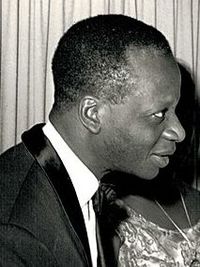Émile Derlin Zinsou facts for kids
Quick facts for kids
Émile Derlin Henri Zinsou
|
|
|---|---|

Emile Zinsou
|
|
| President of Dahomey | |
| In office 17 July 1968 – 10 December 1969 |
|
| Preceded by | Alphonse Amadou Alley |
| Succeeded by | Iropa Maurice Kouandété |
| Personal details | |
| Born | 23 March 1918 Ouidah, Dahomey |
| Died | 28 July 2016 (aged 98) Cotonou, Benin |
| Spouse | Florence Atayi Guy Gaspard |
| Profession | Politician, physician |
| Signature | |
Émile Derlin Zinsou (born March 23, 1918 – died July 28, 2016) was a politician and doctor from Dahomey. He served as the President of Dahomey (which is now called Benin) from July 17, 1968, to December 10, 1969. He was supported by the military government that took power in 1967. Zinsou was also present when the treaty to create the African Union was signed in Togo on July 12, 2000.
Biography
Early Life and Medical Career
Émile Zinsou was born in Ouidah on March 23, 1918. He went to school in Porto-Novo and at the Ecole William Ponty in Senegal. He studied medicine at the Dakar Medical College and became a doctor.
Zinsou worked as a doctor in the French army from 1939 to 1940. After that, he opened his own doctor's office. He soon started to get involved in politics during the colonial period.
Political Journey and Presidency
Zinsou helped start the first political party in Dahomey, called the Union Progressiste Dahoméenne (UPD). In 1945, he worked with Sourou-Migan Apithy. He also served as a representative in the French National Assembly.
From 1947 to 1953, he was the vice president of the Assembly to the French Union. During this time, the UPD party split into different groups. These groups were led by Apithy, Hubert Maga, and Justin Ahomadégbé-Tomêtin. Zinsou then combined the rest of the UPD with another party to form the Union Démocratique Dahoméenne.
He was a senator in France from 1955 to 1958. While a senator, Zinsou became good friends with Léopold Sédar Senghor, who later became the President of Senegal. Zinsou was also a representative in Dahomey's local assembly. He was the Minister of Commerce from 1958 to 1959.
Zinsou did not want France's African colonies to break apart after they became independent. He was the secretary of a group called the Parti du Regroupement Africain (PRA). He disagreed with Apithy in 1959. This happened after Apithy changed his mind about a plan for a Mali Federation, which was a main idea of the PRA.
After Dahomey became independent, Zinsou became the ambassador to France. Under President Maga, he was the Minister of Foreign Affairs from 1962 until 1963. In 1964, he was a candidate for a top role in the Organization of African Unity.
In 1965, he worked as an advisor for a company in Paris. Zinsou became the foreign minister again from late 1965 to 1967. This was during the time General Christophe Soglo was in charge.
Following a military takeover in 1967, and an election where many people did not vote in 1968, the military chose Zinsou to be president. He became president on July 17, 1968. This was surprising because he usually did not support military rule.
As President, Zinsou worked to stop illegal trading. He also tried to prevent strikes and improve how taxes were collected. Some people were not happy with these changes. Military officers were also upset because he acted independently. Because of this, his chief of staff, Maurice Kouandété, removed him from power on December 10, 1969. Zinsou was hurt when his palace was attacked, and two of his bodyguards died.
In the 1970 presidential election, Zinsou received only a small percentage of votes. He turned down an offer to join a special council of presidents. Instead, he decided to move to Paris.
Later Life and Passing
Zinsou was against the one-party policies of Mathieu Kérékou. Kérékou ruled Benin from 1972 to 1990. In 1975, Zinsou was accused of being involved in a coup attempt. He was found guilty without being present in court.
On January 16, 1977, there was another attempt to overthrow the government in Benin. A group of armed men led by "Colonel" Bob Denard tried to remove President Kérékou. Denard later wrote that Zinsou was supposed to become president again if the plan worked. He said Zinsou was waiting on the mercenaries' plane when the attempt failed. Zinsou always said he was not involved in this coup attempt.
In 1990, Zinsou came back to Benin after being away for 17 years. He did not agree with the new constitution in the vote on December 2, 1990, but it was approved. Zinsou helped as a mediator in the Democratic Republic of the Congo during its civil war in the late 1990s. He arrived in Kinshasa on September 20, 1999, and met with President Laurent-Désiré Kabila.
As of 2007, Zinsou was the Honorary President of the National Union for Democracy and Progress political party. In January 2006, he said he supported Yayi Boni in the March 2006 presidential election.
Zinsou, like other world leaders, contributed to a special disc left on the Moon by the astronauts of Apollo 11. Émile Zinsou passed away at his home in Cotonou, Benin, on July 28, 2016. He was 98 years old.
See also
 In Spanish: Émile Derlin Henri Zinsou para niños
In Spanish: Émile Derlin Henri Zinsou para niños
 | Kyle Baker |
 | Joseph Yoakum |
 | Laura Wheeler Waring |
 | Henry Ossawa Tanner |

